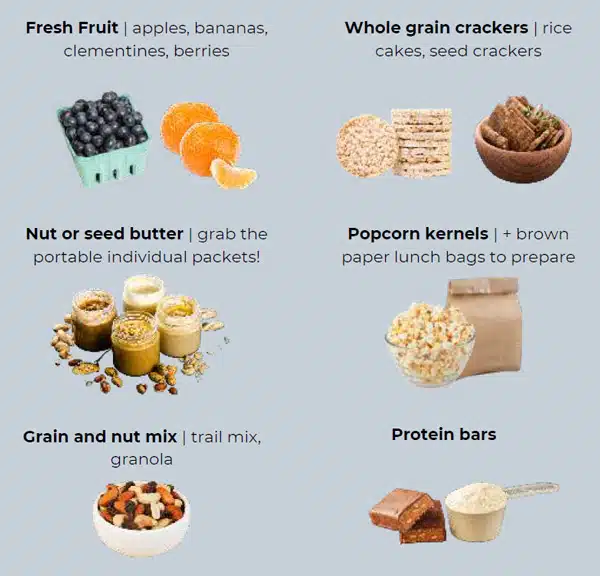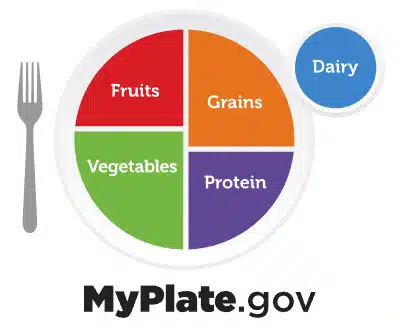Learn how to eat healthy in college with practical tips for busy students. Discover easy ways to maintain a balanced diet while navigating campus life!

Eating healthy in college can feel like an uphill battle. Between juggling classes, study sessions, and social activities, it’s tempting to grab quick, unhealthy snacks or skip meals altogether. But establishing healthy eating habits is crucial for maintaining your energy, focusing on your studies, and avoiding the dreaded Freshman 15.
Whether you’re a freshman adjusting to dorm life or a senior managing off-campus living, this guide provides practical tips to help you eat healthy and thrive in college.
Ready to start your journey towards healthier eating? Click the image or link below to download our comprehensive PDF guide packed with tips and tricks to help you make nutritious choices on campus. Or, keep reading for a quick overview of how to eat healthy in college!
Why Busy College Students Need Healthy Eating
College students often face health challenges that could be improved with better nutrition. Here are some common issues:
- Fatigue and Low Energy: Many students report eating fast or skipping meals like breakfast, leading to low-energy levels throughout the day. Healthy eating habits, such as starting the day with a nutritious breakfast or keeping snacks on hand like granola or a piece of fruit, can help maintain energy.
- Poor Concentration and Academic Performance: Poor eating choices, such as unhealthy food or high added sugar intake, can negatively impact concentration and focus during study sessions. Incorporating healthy food options like fresh fruits, leafy greens, and whole grains can boost your cognitive function and keep you alert.
- Digestive Issues: Unhealthy options, like fried foods and meals high in calories, can lead to digestive discomfort. Instead, try to eat more fiber-rich foods, such as rice cakes, oatmeal, and fresh vegetables, to keep your digestive system in check.
To give you a fighting chance at staying healthy, here’s the ultimate guide to eating healthy in college. Here are the main sections:
- Stock Your Dorm Room with Healthy Snacks
- Tips for Dining Hall Confidence
- Healthy Grocery Shopping on a Budget
By following these nutrition tips and making smarter food choices, you can stay healthy, manage your weight, and boost your overall health during your college years.
1. Stock Your Dorm Room with Healthy Snacks
One of the best ways to ensure you’re eating healthy is to keep nutritious snacks on hand in your dorm room. Snacks like fresh fruits, nuts, granola, and rice cakes are not only convenient but also packed with nutrients that will help maintain your energy levels throughout the day. When hunger strikes between meals, reaching for a healthy snack can prevent overeating later on and keep you on track with your health goals.
Bonus Tip: Plan Ahead with Meal Prep
For busy college students, meal prepping can be a lifesaver. By preparing meals in advance, you can ensure that you have healthy food available throughout the week, even when your schedule gets hectic.
Planning helps students find success in many ways, including staying healthy at college. Skipping breakfast can lead to overeating later in the day, so make sure you’re planning to start your day with a nutritious meal.

Simple recipes like chili’s, stir-fries, and grain bowls can be made in large batches and stored for later use. Not only does this save time, but it also helps you avoid the temptation of unhealthy fast food. With a little planning, you can set yourself up for success and maintain a healthy diet even on your busiest days.
2. Tips for Dining Hall Confidence
Our guide recommends 5 tips to make the dinning hall work for you, not against. It’s about choosing healthy options when you can, and skipping unhealthy options with added sugar:
- Follow the Plate Method
- Start with a Salad
- Skip Sugar-Sweetened Beverages
- Be Choosy with Dessert
- Slow Down to Stay Satisfied
Navigating the dining hall can be overwhelming with so many food options available. To make healthier choices, try following the Plate Method. This involves filling half your plate with fruits and vegetables, a quarter with lean protein, and the remaining quarter with whole grains like brown rice.

Many dining halls offer salad bars, which are great for getting your daily dose of leafy greens and other vegetables. Remember to be mindful of your beverage choices as well—opt for water or unsweetened tea instead of sugary drinks.
Bonus Tip: Stay Hydrated
Staying hydrated is crucial for overall health, yet it’s something that many college students overlook. Carrying a water bottle with you throughout the day is a simple way to ensure you’re drinking enough water. Proper hydration supports everything from energy levels to cognitive function, and it helps you avoid sugary drinks that are high in calories.
Make it a habit to refill your water bottle regularly, and your body will thank you.
3. Healthy Grocery Shopping on a Budget
Grocery shopping on a college budget doesn’t mean you have to sacrifice nutrition. With a little strategy, you can find healthy food options that won’t break the bank. Here are some quick tips:
- Incorporate meatless proteins sources
- Stock up during sales
- Batch cook if possible
Look for sales on non-perishable items like whole grains, beans, and nuts, and stock up when prices are low. Fresh fruits and vegetables are essential for a balanced diet, and you can often find affordable options at local markets or grocery stores. Additionally, consider incorporating plant-based proteins like lentils and tofu into your meals—they’re nutritious, filling, and often more affordable than meat.
By being smart about your grocery shopping, you can maintain a healthy diet without overspending.
Eat Healthy in College This Year!
Eating healthy in college doesn’t have to be difficult. By stocking your dorm with healthy snacks, mastering the dining hall, making breakfast a priority, planning your meals, staying hydrated, and shopping smartly, you can maintain a nutritious diet that supports your overall health and well-being. Remember, the choices you make now can set the foundation for a lifetime of healthy habits. So take control of your diet, and enjoy all the benefits that come with eating healthy in college.
Looking for more healthy hacks? Take a bite out of these:
- Guide: Eat Well: Guide to Healthy Eating
- Guide: From A to Zinc: FLCCC Nutrient Guide
- Guide: Stress Management Guide
For more tips & guides, stay with us here in the Tools & Guides section!




